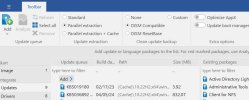You are using an out of date browser. It may not display this or other websites correctly.
You should upgrade or use an alternative browser.
You should upgrade or use an alternative browser.
Boot Manager Option
- Thread starter Bournesup
- Start date
If you're referring to the Boot Manager components, every PC requires the boot type version (UEFI or MBR) that's enabled by your BIOS.
W11 officially only supports UEFI boot mode, so the (PCAT) version becomes optional. But some users can trick W11 into running on a MBR setup, even though that's unsupported.
If you don't have the matching Boot Manager, then Windows won't boot at all.
- For an UEFI-only PC, Boot Manager (UEFI) is required.
- For a legacy-only PC, Boot Manager (PCAT) is required.
- When you can install on either boot type, both Boot Managers should be kept.
W11 officially only supports UEFI boot mode, so the (PCAT) version becomes optional. But some users can trick W11 into running on a MBR setup, even though that's unsupported.
If you don't have the matching Boot Manager, then Windows won't boot at all.
I expect nuhi's looking ahead at the UEFI boot code revocations planned for late 2024, to prevent users from using the insecure boot loaders. In that case, you would need to cache the latest boot files and apply them to all old images.
No, we're talking about last year's news where the Black Lotus UEFI rootkit makes all UEFI PC's vulnerable to hacking. To prevent it, all Windows and Linux images must replace their boot loader files, and BAN the older files by revocating their digital certificates.
NTLite already has some logic to check the boot files, and has some idea if those are eligible for banning. Because W11 has not yet started to make changes mandatory, this feature will stay in development.
NTLite already has some logic to check the boot files, and has some idea if those are eligible for banning. Because W11 has not yet started to make changes mandatory, this feature will stay in development.
- Messages
- 854
- Reaction score
- 155
If you talk about this :
The option is available here : Updates page - toolbar - tooltip for Update boot managers
The option is available here : Updates page - toolbar - tooltip for Update boot managers

